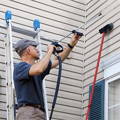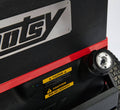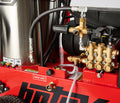Pressure Washing Pricing Guide: When Does a System Pay for Itself?
Published:
5/21/2021
As a general cleaning contractor, you provide pressure washing services for residential areas, businesses, and industries. As your business expands, you'll find yourself handling larger and longer contracts.
Eventually, you'll have to decide if you should upgrade your cleaning equipment to help you meet daily client needs. Purchasing a pressure washer or upgrading your current pressure washer is a significant decision.
Cleaning equipment requires capital and maintenance. You need to know how much it costs to purchase a new pressure washer versus renting equipment and how long you must wait until the equipment starts paying for itself. How can you maintain a healthy cash flow after purchasing equipment?
These are crucial factors before buying any pressure washer. NorTex Sales & Service in Dallas addresses these and more concerns in our pressure washing pricing guide.

Pressure Washing Pricing Guide: What Do You Charge?
Before considering when the financial benefits of buying a new pressure washer outweigh the initial costs, it’s important to understand how you will make that money back.
The power washing business is highly competitive. As such, you should make calculated moves to keep your business afloat. Your pricing needs to be high enough that you make profits but low enough to attract customers. Here are some considerations you should make when pricing your services.
Overhead Costs
First, you need to make sure that you can afford your expenses. Your expenses are the costs of operation to generate revenue. Make a list of your monthly expenses. (Assume your month is 4 weeks).
Expenses include:
- Spending on equipment rental, maintenance, and fuel costs
- Supplies such as detergent and oil
- Utilities
- Wages
- Transport costs
- Rent and office operation costs
- Interests on loans and tax payments
- Insurance
In the second step, calculate the number of hours you'll put your power washer to work.
For example, if you work an average of six hours for six days per week, it means your machine is operational for 36 hours every six-day workweek. Let's assume your month is four weeks long — it means your power washer works for 144 hours.
Divide your total monthly expenses by the working hours per month to find the amount you should produce per working hour to break even. You have to make this amount to manage your expenses.
In the third step, make adjustments for profits and fluctuations. Profits are vital to pay yourself and expand your business. Planning for fluctuations helps you weather low season, sudden demand shifts, and rising variable costs.

Perform Competitive Analysis
Once you know what it takes to break even, it's time to investigate your competitors' pricing. Who are the main competitors in your area? What do power washing companies in your area charge? What are customers paying for power washing services? Gather as much information as possible to determine the lowest and highest price.
Analyze the competitors' prices and compare them against the services provided. Your pricing will depend on your positioning in the market. A new general cleaning contractor may offer below-the-average market pricing. However, working below the market average may not be in your best interests if you have established your business. Check out premium pricing to attract clients seeking quality and professional power washing services.
Price Your Services
You can use various models to prepare your price list. In most cases, power washing is quoted on a square-foot basis. Calculate the time it takes to clean different surfaces — a fleet of vehicles, a concrete parking lot, a wall, or a standard-size residential home.
Use these time estimates to create a price list for various jobs. However, because customers may need help to accurately measure their surfaces' sizes, use the price list for estimated pricing.
Whenever a customer asks for a quote, use your estimates to prepare a quote, but inform them that the actual charges ultimately depend on the measurements on-site. You can also use your calculations to show customers that you have a reliable method for calculating your costs.
You can also use hourly rates for surfaces that are difficult to measure. This model ensures that you're paid for the hours worked. Lastly, you may consider a flat rate for jobs you've done before. However, a flat rate ties you to a specific amount, even if you could earn more.
In addition, you can vary your pricing depending on the job's nature or have different contract charges versus one-time jobs.
Assess Areas of Improvement
Since you've been in business for a while, note your inefficiencies and areas that need changes. How will these changes affect future pricing? If you plan on using a loan to pay for new efficient power washers, your pricing point needs to accommodate the loan and interest payments.
Pressure Washer Prices
Now that you have your pricing model established, you can begin considering when your investment will pay for itself. The cost of pressure washers depends on several factors.
Hot vs. Cold
Generally, hot water pressure washers are typically more expensive than cold water pressure washers. Hot-water pressure washers are necessary for specialized jobs, while cold-pressure washers can handle most residential jobs. Do you need a hot or cold water pressure washer?
The Model
In addition to hot vs. cold, prices vary per machine model.
PSI (Pound Per Square Inch)
Generally, the more powerful the washer, the more it costs. Gas-powered washers typically have a higher PSI (over 2000) than electric ones. If you're doing heavy-duty cleaning, gas power washers are ideal for you.
Gas vs. Electricity
Your power source affects your expenses and determines if your power washer can pay for itself.
Generally, gas-powered power washers cost more than electric-powered ones. Also, remember gas requires refills, which increases the operational costs.
Request a Quote
The only sure way to know the cost of a pressure washer is to ask for a quote. Let NorTex Sales & Service make it easier to understand when your pressure washer will pay for itself and how much it costs.
Share this Article ↓




